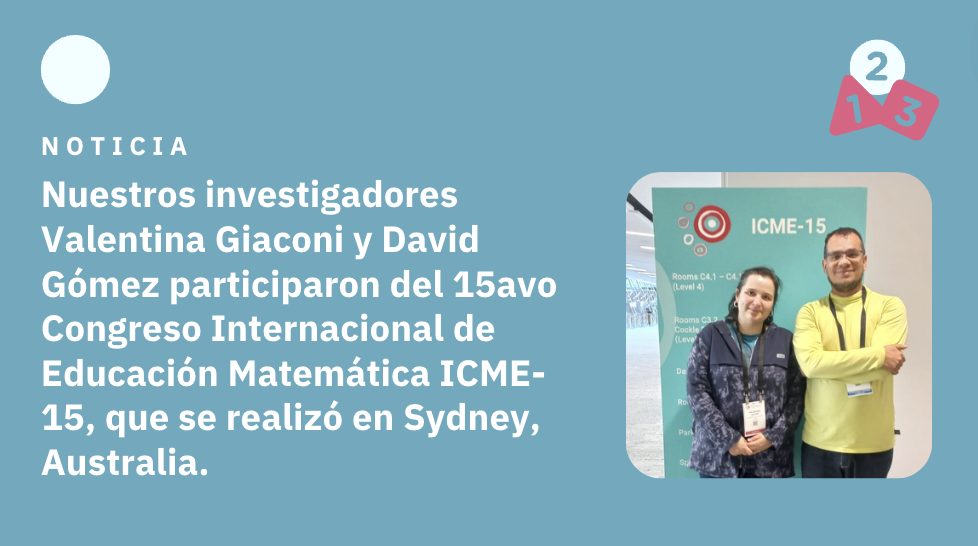Muchas personas ven la matemática como un área del conocimiento compuesta por múltiples métodos de cálculo, los que deben ser aprendidos de memoria y aplicados rigurosamente al pie de la letra. Esta visión de la matemática, a pesar de ser ampliamente compartida, es problemática.
Archivos del Autor: memat
ICME-15, el evento académico más grande de educación matemática a nivel mundial.
Ya que los resultados de pruebas estandarizadas de matemáticas en Chile muestran una brecha de género cada vez más temprana, nos preguntamos si los niños y niñas chilenos de kínder sostienen creencias de género que afecten el aprendizaje equitativo de las matemáticas.
Fernanda presentó un poster de la investigación que realizó en conjunto con María Inés Susperreguy, directora de MEMAT, Marigen Marea del CJE y las codificadoras Isel Arrieta, Francisca Salinas y Antonia Vega. El poster se titula: «MATH ACTIONS OF MOTHERS AND INFANTS IN”.
Muchas personas ven la matemática como un área del conocimiento compuesta por múltiples métodos de cálculo, los que deben ser aprendidos de memoria y aplicados rigurosamente al pie de la letra. Esta visión de la matemática, a pesar de ser ampliamente compartida, es problemática.
En este estudio nos preguntamos qué prácticas de enseñanza utilizan docentes de ciencias para facilitar discusiones productivas y argumentativas en aulas escolares, y los desafíos que enfrentan al desarrollar estas prácticas, de acuerdo con lo que indica la literatura.
En Matematics, invitamos a niños y niñas a explorar y conocer sobre los números y sus relaciones con la cotidianeidad, a través del juegos educativos que usan la tecnología.
La Dra. Ana María Espinoza presentó el trabajo titulado «Brechas de Género en Matemáticas: ¿Qué sabemos sobre el conocimiento, la confianza, ansiedad y auto-concepto matemático de futuros/as docentes?».
La disminución de la biodiversidad de la Tierra plantea desafíos bioculturales críticos, incluida la soberanía alimentaria y la adaptación al cambio climático.
En el evento, uno de los de mayor relevancia a nivel mundial sobre capacidades cognitivas y de aprendizaje, nuestros investigadores presentaron parte del trabajo de MEMAT en torno al aprendizaje matemático temprano.










